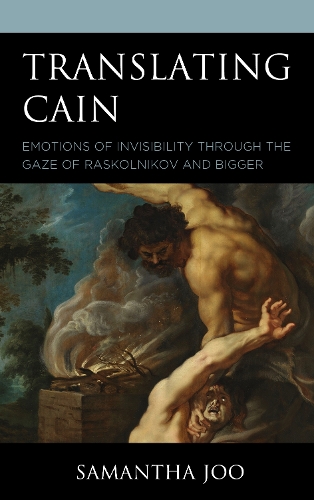
Translating Cain: Emotions of Invisibility through the Gaze of Raskolnikov and Bigger
(Hardback)
Publishing Details
Translating Cain: Emotions of Invisibility through the Gaze of Raskolnikov and Bigger
By (Author) Samantha Joo
Bloomsbury Publishing PLC
Lexington Books/Fortress Academic
10th December 2020
United States
Classifications
Professional and Scholarly
Non Fiction
Christianity
Judaism
Ethnic studies / Ethnicity
Social and cultural history
Comparative literature
222.11092
Physical Properties
Hardback
200
Width 163mm, Height 237mm, Spine 17mm
426g
Description
Unless we recognize the cultural context embedded in the Genesis story of Cain and Abel, the significance of Cains rejection and consequent violence is often lost in translation. While many interpreters highlight the theme of sibling rivalry to explain Cains murderous violence, Samantha Joo relates Cains anger and shame to the social marginalization of Kenites in ancient Israel, for whom Cain functions narratively as an ancestor.
To better understand and experience Cains emotions in the narrative, Joo provides a method for re-contextualizing an ancient story in modern contexts. Drawing from post-colonial theories of Latin America translators, Joo focuses on analogies which simulate the moveable event of a story. She shows that novels like Fyodor Dostoevskys Crime and Punishment and Richard Wrights Native Son, in which protagonists kill to escape their invisibility, capture the event of Cain and Abel. Consequently, readers can empathize with the anger and shame resulting from the social marginalization of Cain through the alienation of a poor, ex-university student, Raskolnikov, and the oppression of a young black man, Bigger Thomas.
Reviews
In this deft interweaving of shared and timeless themes from three very different texts and contexts, the iconic myth from the Bible, of Cain's murder of his brother Abel, is translated to speak to the violence of our present. Joo has produced a work of subtlety and wisdom, which demonstrates that the past abides and haunts.
-- Johanna Stiebert, University of LeedsWho knew that the story of Cain and Abel is so rich and relevant In this carefully argued and richly documented book, Samantha Joo offers a new reading of this brief story by elucidating its ancient context while reading it alongside Wrights Native Son and Dostoevskys Crime and Punishment. This compelling interpretation brings the biblical story to bear on contemporary life by highlighting the themes of social marginalization, shame, anger, dehumanization, and the other in the biblical story, which illustrates how invisibility can lead to bloodshed. The book creates a deeply satisfying dialogue between more traditional historical-critical and new methods.
-- Marc Zvi Brettler, Duke UniversityEmploying a theoretical approach informed by post-colonial studies, socio-linguistics, and the field of comparative literature, Samantha Joo explores the emotional dynamics and ethnographic implications of the biblical story of Cain. Juxtaposing this composition with two classic novels, Dostoevskys Crime and Punishment and Richard Wrights Native Son, Joo produces an original analysisa creative, thoughtful study with deep implications for religious ethics.
-- Susan Niditch, Amherst CollegeAuthor Bio
Samantha Joo is the academic advisor and adjunct faculty at the Iliff School of Theology.
